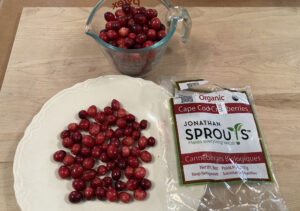





The last of the 2022 fall season’s crop of fresh Cape Cod cranberries recently inspired the preparation of a dozen cranberry pecan muffins by this home baker. For years, this long-term member of the Honest Weight Food Co-op in Albany, New York, has kept an eye out for the stocking of fresh Jonathan SPROUTS organic Cape Cod Cranberries in the fall. On the packaging, these cranberries are described as “New England Heritage Organic Cranberries.”
Cape Cod is a popular vacation destination for people who live in the Capital Region of upstate New York, and although 200 miles away, it’s always felt like this home baker was using “local” cranberries in the fall season.
Stocking up on fresh Cape Cod organic cranberries is a must-do when the two main ingredients for the customary breakfast consists of steel cut oats and a cup of fresh organic cranberries. And they are also perfect to use in preparing homemade cranberry pecan muffins, and of course for homemade cranberry sauce for the Thanksgiving feast.
My well-thumbed copy of Edible An Illustrated Guide to the World’s Food Plants (Washington, D.C.: National Geographic Society, 2008) has an informative page on cranberries. As noted in Edible, all the world’s cranberries (96 percent) are grown in the United States and Canada. Indigenous to North America, cranberries were used extensively, both fresh and dried, by native Americans, especially in pemmican, a preserved meat product made of dried game meat, cranberries and fat. Gathered wild until cultivation began in the 19th century, cranberries “have become increasingly popular in recent years because of their medicinal qualities.”
Earlier this month, the Honest Weight’s produce department’s supply of fresh organic Cape Cod cranberries was dwindling down, and I decided to stock up on a few more packages. Of course, the freezer was already well-supplied with frozen packages of Cape Cod cranberries purchased fresh earlier when I noticed a sale during the week before Thanksgiving at the co-op.
Nonetheless, it was an easy decision to bake up a batch of cranberry pecan muffins, lightly sweetened with less than a cup of maple syrup, using one of the last packages of fresh cranberries purchased at the co-op a couple weeks ago.
Now as January soon turns into February, 2023, instead of cranberries and local eco-apples, the Honest Weight’s produce department is offering a bountiful supply of oranges, including organic Cara Cara oranges.
In an article on Kitchn, the “food site made by a nationally distributed staff of home cooks,” an article by Kelli Foster, “Cara Cara Oranges Prove It’s What’s on the Inside That Counts” notes that “It’s not just their beautiful color that makes them stand out- they have a remarkable taste that goes right along with it.” Foster notes further that compared to traditional navels, they’re “sweeter, slightly tangy, and less acidic, with a hint of red fruit, like cranberry or blackberry.” Truly delicious, this co-op shopper stopped in his tracks when he saw organic Cara Cara oranges were available at the Honest Weight.
It required a magnifying glass to read the very small print on the stickers which are used to note the “organic” quality of the Cara Cara oranges on sale at the Honest Weight. Upon close inspection, the co-op’s organic Cara Cara oranges were from Homegrown Organic Farms. A google search resulted in some praiseworthy details about Homegrown Organic Farms.
The company was founded in 1998 by John and Cindy France, who in a press release when their company transitioned from a corporation to an Employee Stock Ownership Plan (ESOP) in 2021, noted that they “have always had a heart for their employees” by offering “far above industry-standard benefits to creating a healthy work environment.” Bravo.
Located in Porterville, in California’s San Joaquin Valley, Homegrown Organic Farms represents over 6,000 acres of organic production. On the home page of its website, Homegrown Organic Farms notes in bold type-face that “Organic Fruit Is Our Passion.” The company now represents more than 80 growers “who take great care to provide healthy, safe and delicious organic produce.” Its website also includes information on the “diversity of our growers” and “their stories behind organic farming.”
It is undeniable that the organic Cara Cara oranges that I’ve been purchasing at the Honest Weight are not “local” when Albany in wintry upstate New York is nearly 3,000 miles away from the San Joaquin Valley. On the other hand, these organic oranges can be said to be “seasonal” and at four for $5.00, they’re a healthy and delicious food to have in the fridge.
On its website, Homegrown Organic Farms has a tab for “Fresh Fruit” which provides links to availability and nutritional information on the organic fruits it offers: blueberries, citrus, stonefruit, grapes, and fall fruit. The webpage with information on its citrus offerings shows the months of the year when 13 different types of citrus fruits are available.
According to information on Homegrown Organic Farms’ website, Cara Cara Navel oranges are available for four months from December to March which explains why as January turns into February, it’s the height of the season to enjoy this delicious citrus fruit. Not local, but it’s fair to say “seasonal,” and a good time to include them in a healthy diet.
(Frank W. Barrie, 1/27/23)





